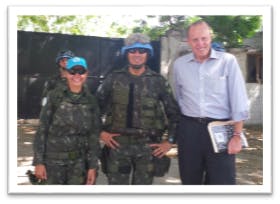Flying at 39,000 feet on my return home from Haiti, I finally had a few moments to think about what I saw and heard over the past few days in the country.
Certainly I was struck by what has changed on the surface in the three years since my last visit to Haiti: the near-absence of 2010 earthquake rubble from the streets and the movement of hundreds of thousands of Haitians from temporary shelter to more permanent homes.
And as we think ahead to Haiti’s future, everything depends on maintaining peace and security, and creating an environment to attract investors and jobs for the country’s incredibly young workforce. I keep returning to the largely unheralded role played by United Nations peacekeepers in Haiti – both soldiers and police officers – in creating this future, and how this role will change in the years ahead.
- After the devastating 2010 earthquake, UN peacekeepers protected hundreds of thousands of Haitians displaced from their homes and provided security for the delivery of life-saving food, shelter, water and sanitation. To date, 95 percent of these internally-displaced Haitians have moved out of the camps and back into their communities. That was the goal all along.
- Engineering peacekeeping units from the Uruguayan military reconstructed buildings throughout the country – roads, schools, clinics, and community centers. The reconstruction process remains ongoing, but the rubble from the 2010 disaster has long been cleared from the streets and the Haitian Government is increasingly able to assume this important responsibility.
- The Haitian National Police – which patrol the streets of Port-au-Prince and protect people going about their daily lives – will soon reach its targeted level of 15,000 officers. UN peacekeepers played an absolutely critical role in standing up this Haitian-led police force and ensuring that it is a quality operation. Their work is a big reason why the national police have earned confidence and respect as one of the country’s most trusted institutions.
Still, though much progress has been made, UN peacekeepers and the entire UN team in Haiti have their work cut out for them, even as we see a significantly reduced UN footprint in the years ahead.
UN peacekeepers, largely drawn from Latin American militaries such as Brazil and Paraguay, will be returning to their homes over the next couple of years.
And many of the Haitian people with whom we met are ready for them to go. That’s expected – Haitians are particularly proud of being the first Latin American country independent from colonial powers.
It’s not that the UN peacekeepers haven’t done an exceptional job – a job welcomed by both the Haitian Government and the Haitian people – they have. And their work will continue to be essential to supporting Haiti as it faces the many challenges that remain.
One challenge in particular stands out – national elections. In the coming months, the Haitian National Police and UN peacekeepers will need to work together to provide security once Haiti’s long-delayed national elections are scheduled (this can’t come soon enough). The UN stands waiting in the wings to provide logistical support and assist in the electoral process once the Haitian government green lights the election.
Even more challenging is the justice system. I visited Haiti’s only women’s prison where 245 inmates have yet to go to trial. This prolonged detainment of alleged perpetrators is a crisis that the Haitian government still needs to address. The UN provides support to legal aid offices to help with due process but some perpetrators have been imprisoned without a trial for longer than the required sentence for the accused crime. The UN, the U.S. and other donors are working diligently with Haitians to fix their judicial system.
As the UN peacekeeping force draws down in the coming years in accordance with UN Security Council mandates – the police officers among UN peacekeepers will be the last to go – they can leave knowing they made a substantial contribution to Haiti’s future.
As an expression of our gratitude to UN peacekeepers for the important role they continue to play in Haiti, it was my pleasure to present hand-written thank you cards from our nationwide Thank A Peacekeeper campaign to Sandra Honoré, the Secretary-General’s Special Representative in Haiti. It was my way of saying thanks for all the work the UN has done to empower Haitians to lift themselves from the rubble and move their nation toward a more positive future.



 View All Blog Posts
View All Blog Posts